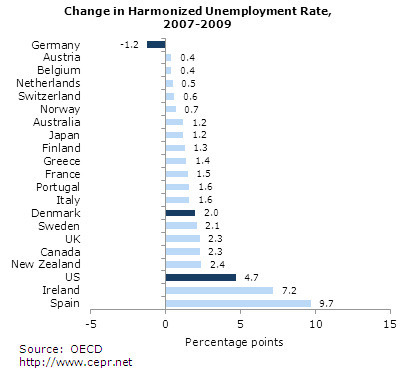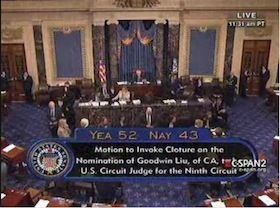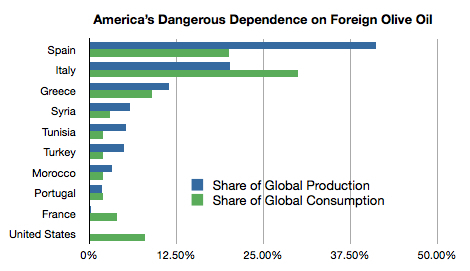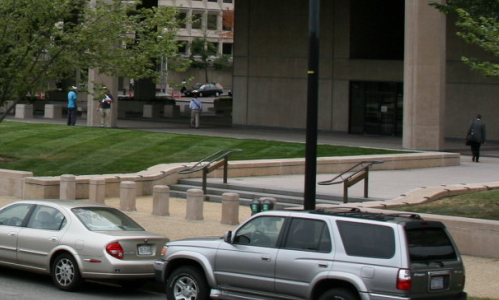Matthew Yglesias's Blog, page 2304
May 19, 2011
The Success Of German Labor Market Policy
John Schmitt takes a look at Germany vs Denmark during the Great Recession:

Denmark, which was widely seen as one of the world's most successful labor markets before the downturn, has struggled in recent years. Germany, however, has outperformed the rest of the world's rich countries since 2007, despite earlier labor-market difficulties. Labor-market institutions seem to explain the different developments in the two economies. Danish institutions – which include extensive opportunities for education, training, and placement of unemployed workers – appear to perform well when the economy is at or near full employment, but have not been effective during the downturn. German labor-market institutions, which emphasize job security by keeping workers connected to their current employers, may have drawbacks when the economy is operating at or near full employment, but have performed well in the Great Recession.
Certainly Germany does seem to be showing us in part that the best way to avoid mass unemployment during a downturn is to directly target employment.


Hypocrisy Bonanza As Senate Republicans Mount Filibuster of Goodwin Liu They Previously Deemed Unconstitutional

Goodwin Liu's nomination to serve on the 9th Circuit came up for a vote today and Senate Republicans filibustered it to death. Ian Milhiser notes that many of those who voted to block an up-or-down vote on Liu until recently viewed the filibustering of judicial nominees to be categorically evil:
— Lamar Alexander (R-TN): "I would never filibuster any President's judicial nominee, period. I might vote against them, but I will always see they came to a vote."
— Saxby Chambliss (R-GA) and Johnny Isakson (R-GA): "Every judge nominated by this president or any president deserves an up-or-down vote. It's the responsibility of the Senate. The Constitution requires it."
— Tom Coburn (R-OK): "If you look at the Constitution, it says the president is to nominate these people, and the Senate is to advise and consent. That means you got to have a vote if they come out of committee. And that happened for 200 years."
— John Cornyn (R-TX): "We have a Democratic leader defeated, in part, as I said, because I believe he was identified with this obstructionist practice, this unconstitutional use of the filibuster to deny the president his judicial nominations.
— Mike Crapo (R-ID): "Until this Congress, not one of the President's nominees has been successfully filibustered in the Senate of the United States because of the understanding of the fact that the Constitution gives the President the right to a vote."
— Chuck Grassley (R-IA): "It would be a real constitutional crisis if we up the confirmation of judges from 51 to 60, and that's essentially what we'd be doing if the Democrats were going to filibuster."
— Mitch McConnell (R-KY): "The Constitution of the United States is at stake. Article II, Section 2 clearly provides that the President, and the President alone, nominates judges. The Senate is empowered to give advice and consent. But my Democratic colleagues want to change the rules. They want to reinterpret the Constitution to require a supermajority for confirmation."
As I wrote at the time the correct progressive response to the "nuclear option"/filibuster controversy of 2005 would have been to seize the opportunity to eliminate or phase-out the filibuster. Had that happened, a few more right-wing judges would be on the bench today but much more progressive legislation could have passed in the 111th Congress and those extra conservative jurists would be counter-balanced by first-rate progressive jurists like Goodwin Liu.


What If The Treasury Department Ignored The Debt Ceiling
I've seen some remarks to the effect that the statutory debt ceiling may be unconstitutional. I think the better point is Jonathan Zasloff's, namely that there doesn't seem to me to be any legal remedy at anyone's disposal if the Treasury Department wants to keep selling debt and financial markets want to keep buying it:
But if the administration takes the position that it must continue to borrow to comply with the Fourteenth Amendment, who would stop it? Put another way, who would have standing to sue? Taxpayers clearly would not. Individual members of Congress? No: the Supreme Court's 1997 decision in Raines v. Byrd would seem to foreclose that. Congress as a whole? Perhaps; but what would it require for Congress as a whole to bring the lawsuit? A joint resolution would be blocked by Senate Democrats. That leaves the House to bring the lawsuit, and one could easily argue that one house would not have standing any more than individual members of Congress would.
Or to look at it another way, you might think to yourself that the extraordinary measures Treasury is currently taking to skirt the restrictions of the debt ceiling are themselves illegal. But who's empowered to draw the line here? Nobody seems to have standing to sue, and on top of that it seems like a "political question."


The Vast Majority French Socialists Think Dominique Strauss-Kahn Was Set Up
Via Erik Voeten, a survey (PDF) shows that 57 percent of all French people and 70 percent of French Socialists think former IMF chief Dominque Strauss-Kahn is the victim of a setup:

Just a reminder that political myth-making isn't just something Rush Limbaugh invented one day.


The United States of America Consumes 8 Percent Of World's Olive Oil, Produces Just 0.1 Percent
It's disappointing that in his speech earlier today, Barack Obama didn't tackle America's dangerous dependence on foreign olive oil:

It seems to me that the California Olive Oil Council needs to develop a more robust lobbying/pr effort to raise awareness on this front. I'm eager to offer my services!


Bryan Caplan's Case For Socialism

GMU economics professor and libertarian Bryan Caplan lays out his vision of long-term economic development:
Robin's more specific admission: Wages for humans and robots alike will fall to subsistence levels because intelligent machines will be low-cost near-perfect substitutes for humans. However, human consumption will be much higher, because biological humans will own much more than their own labor – including land, capital, and vast numbers of robots. Robots, in contrast, will have to get by on their wages.
In slogan form: Simon for people, Malthus for robots.
Another way of putting it would be Simon (i.e., plenty) for capital and Malthus (i.e., subsistence) for labor. That, of course, is Karl Marx's vision of long-term economic development. And while I don't have a strong opinion as to whether or not this is accurate over the long term, it's certainly a plausible story about the future, and Marx's solution—socialism—unquestionably seems to me to be the correct one. Marx's forecast of the immiseration of labor and all the returns going to the owners of capital clearly hasn't been true in the 150 years or so since his time, but it certainly could happen. In a weird way we haven't gotten a fair test since it's only quite recently that capitalist economic development has come to huge swathes of the global south.
If the "robots" are really mere machines, then it should be easy to peacefully divide up the surplus more-or-less equitably, we'll transition to socialism and everyone will be happy—it'll be like Star Trek. If the robots are sentient beings, then we'd presumably be looking at an eventual slave revolt and Communist revolution.


Roseanne, Louis C.K., and Women's Power in Hollywood
Image used under a Creative Commons license courtesy leahmarkphotography.
By Alyssa RosenbergTad Friend's profile of Anna Faris in the New Yorker got justifiable attention for its explication of the contempt Hollywood has for female actresses, particularly ones who want to be something other than bland romantic comedy heroines. But it is nothing compared to reading New York's features on Louis C.K. and Roseanne Barr back-to-back. The contrast between the two comedians' experiences, particularly on the question of artistic control and credit, is stunning. As Emily Nussbaum writes about Louis C.K.:
Louis is the director. He's also the only writer, the sole editor (he no longer shares duties with the co-editor he had last season), not to mention the person who oversees music (when the music guy's budget ran out, he decided to do it himself). He also hired his own casting team: Last season, he turned down FX's offer to help out and doesn't inform them about casting in advance. But perhaps the most unusual aspect of the show is that Louis C.K. gets no notes from the network during filming, no script approval—an unheard-of "Louis C.K. deal" that has made him the envy of comics and TV writers alike…John Landgraf, the president of FX, offered him $250,000 to make a series about his life, a number that included Louis's salary. "I thought, I'm too fucking old to stand in the cold with a young crew—and I'm just gonna go through the same shit for less money." But Landgraf impressed Louis, pitching a model designed to keep shows "pure." "I said, 'Okay, the only way I'm doing this is if you literally wire the $200K to me and I go to New York and just make it. I don't gotta tell you what it's about. I don't know what it's about.' "
On the other hand, this is what Roseanne says happened to her:
It didn't take long for me to get a taste of the staggering sexism and class bigotry that would make the first season of Roseanne god-awful. It was at the premiere party when I learned that my stories and ideas—and the ideas of my sister and my first husband, Bill—had been stolen. The pilot was screened, and I saw the opening credits for the first time, which included this: CREATED BY MATT WILLIAMS. I was devastated and felt so betrayed that I stood up and left the party. Not one person noticed…My breakdown deepened around the fourth episode, when I confronted the wardrobe master about the Sears, Roebuck outfits that made me look like a show pony rather than a working-class mom. I wanted vintage plaid shirts, T-shirts, and jeans, not purple stretch pants with green-and-blue smocks. She bought everything but what I requested, so I wore my own clothes to work, thinking she was just absent-minded. I was still clueless about the extent of the subterfuge. Eventually she told me that she had been told by one of Matt's producers—his chief mouthpiece—"not to listen to what Roseanne wants to wear."
Obviously, there are different imperatives for network and cable shows: Louis has a lot of material that would never fly on a network because advertisers and the FCC would both lose it. And the environment for women in 1988 is certainly different than it is today. But in the Writers Guild of America, West report on industry employment released this week, women still are just 28 percent of television writers, and the number of women writers in film is down from 19 percent in 2005, to 18 percent in 2007, to 17 percent in 2009. In 2007, the median salary for a woman television writer was $5,109 less than the median man's salary. By 2009, that gap was up to $9,400. (The numbers for minority writers are much worse.)
Maybe Louis C.K. is the only comic, man or woman, who would have gotten the deal he has with FX. And this fall's crop of television shows is in many ways a high-water mark for women as writers, creators, and stars. Maybe one of them will be the fantastically uninhibited creator and star of her own series. But we're not there yet. Whitney doesn't exactly look like it's going to be Louis:


Obama on Bahrain
What the president just said about Bahrain was good. He called for dialogue, condemned violence against protestors, etc. But it was telling that in the opening laundry-list sections of the speech he said things like "whether you live in Baghdad or Damascus; Sanaa or Tehran" and consistently left Manama off such lists. To me, it seems like a signal that while the administration doesn't approve of the Bahraini government's conduct but it also doesn't intend to actually do anything about it.


To Defend Everything Is To Defend Nothing
Lydia DePillis writes that the procession of target-hardening of government buildings in DC won't be reversed despite Osama bin Laden's death. The best we can hope for is some improved aesthetics:
"The federal office buildings that line most of Pennsylvania Avenue have asked for and want the planters for what most would consider obvious reasons," writes Bill Line, spokesman for the National Park Service, which controls the sidewalk. "I would add that recent world events, especially within the past two weeks in Pakistan, underscore the need." Officials at Federal Protective Services, the agency in charge of keeping U.S. government buildings safe, say they have no plans to replace "temporary" sidewalk obstacles for which they're responsible.
There's also some very good news: As security requirements got baked into new projects, we've actually scored some improved public spaces. The car-free section of Pennsylvania Avenue between 15th and 17th streets NW, redesigned soon after the attacks, has become a staging ground for both protest and contemplation. The new terraces of the Washington Monument grounds serve as places to sit, even as they protect the obelisk and its visitors from careening vehicles. President's Park South, still a maze of Jersey barriers and temporary-looking fences, is finally slated for a makeover by the winner of a design competition that has drawn the best landscape architects in the country.
Bollards at the James A Forrestal Department of Energy Building (cc photo by cliff1066)
I think this really highlights what's wrong with our thinking in this regard. The security around the White House serves a clear and important purpose. It makes it much more likely that a person on the streets of Washington with a car or truck full of explosives will do something with it other than blow up the White House. That, in turn, is important because killing the President of the United States—especially if he's in the middle of a meeting with other important government officials—would seriously challenge the orderly operation of the government. This country has never attempted to implement the Presidential Succession Act and investing money and energy in making sure we don't have to makes sense. If someone is deterred from blowing up the White House and drives over to 1333 H Street to blow up the Center for American Progress, that's a win for American public policy.
But most of the federal buildings that line Pennsylvania Avenue aren't like that at all. It would be a terrible tragedy for someone to blow up the EPA building or the FTC building. But that's just because it would be a terrible tragedy for someone to blow up any large office building. Terrorism is bad, and we should (and do!) use intelligence and law enforcement tools to try to reduce people's ability to acquire truckloads of explosives for nefarious purposes. But passively securing random federal buildings doesn't do much of anything to reduce the overall chances that some building or other will be blown up. It just costs money, inconveniences people, and makes the city uglier.


Correction: Palestine Is Cross-Cut By "No Palestinians Allowed" Roads, Not Jews-Only Roads
Here's a message I got from SG:
Dear Mr. Yglesias
I am a conservative who enjoys reading your blog because of how well you articulate the liberal position and how it differs from the conservative one. However, I have issues with how you characterize the Israeli-Palestinian conflict. You consistently refer to the Palestinian territories as if they were already a country called "Palestine." This is factually incorrect, there has never been an independent Arab country with this name, nor did any of the Arabs who attacked Israel in 1948 seek to set up a Palestinian state. You are also incorrect when you write of "Jews-only" roads in the West Bank. There are no such roads. It is true that there are roads for Israelis only for security reasons, but there are 1 million Israelis who are Arab, and the have identical license plates. I wish you would stop using the term, "Jews-only" to describe these roads because it gives the impression that Israel is practicing South-Africa style apartheid in the West Bank.
Sincerely,
—————
A couple of points on this. One is that I use the term "Palestine" because I think people ought to recognize Palestine's right to exist and that people increasingly will do so after a declaration of statehood that we're expecting to see in September. I think it would be much healthier to think of the territory west of the Jordan River as comprised of two states, Israel and Palestine, engaged in a boundary dispute than the currently prevailing dynamic where the existence of a Palestine is thought to be contingent on good behavior.
On the roads, however, SG is completely correct. There are no "Jews-only" roads in the West Bank and, indeed, when I visited the area I drove on the roads in a van that included both Jewish and non-Jewish Americans. What would be more correct (and, frankly, stranger) would be to say that these are roads accessible to everyone except Palestinians. In terms of the apartheid question, however, this is obviously a distinction without a difference. There are highways through the West Bank that Palestinians can't use. There's a section of Hebron where Palestinians carry goods on donkeys because they're not allowed to use cars. It's true that the exclusion of Palestinians from this infrastructure is done for security reasons, but the infrastructure is being built in order to colonize Palestinian territory. This is a street where Palestinians are only allowed to walk on one side (the smaller side) and non-Palestinians are only allowed to walk on the other:
Meanwhile, Israel claims to have annexed the eastern portion of Jerusalem and a good deal of its surrounding suburbs without granting citizenship to the Palestinian residents of that area or their descendants. It's sensible that Zionists in the United States and elsewhere are concerned about Israeli policy being described in apartheidesque terms, but the correct expression of this concern is to try to change the policies not the descriptions.


Matthew Yglesias's Blog
- Matthew Yglesias's profile
- 72 followers






